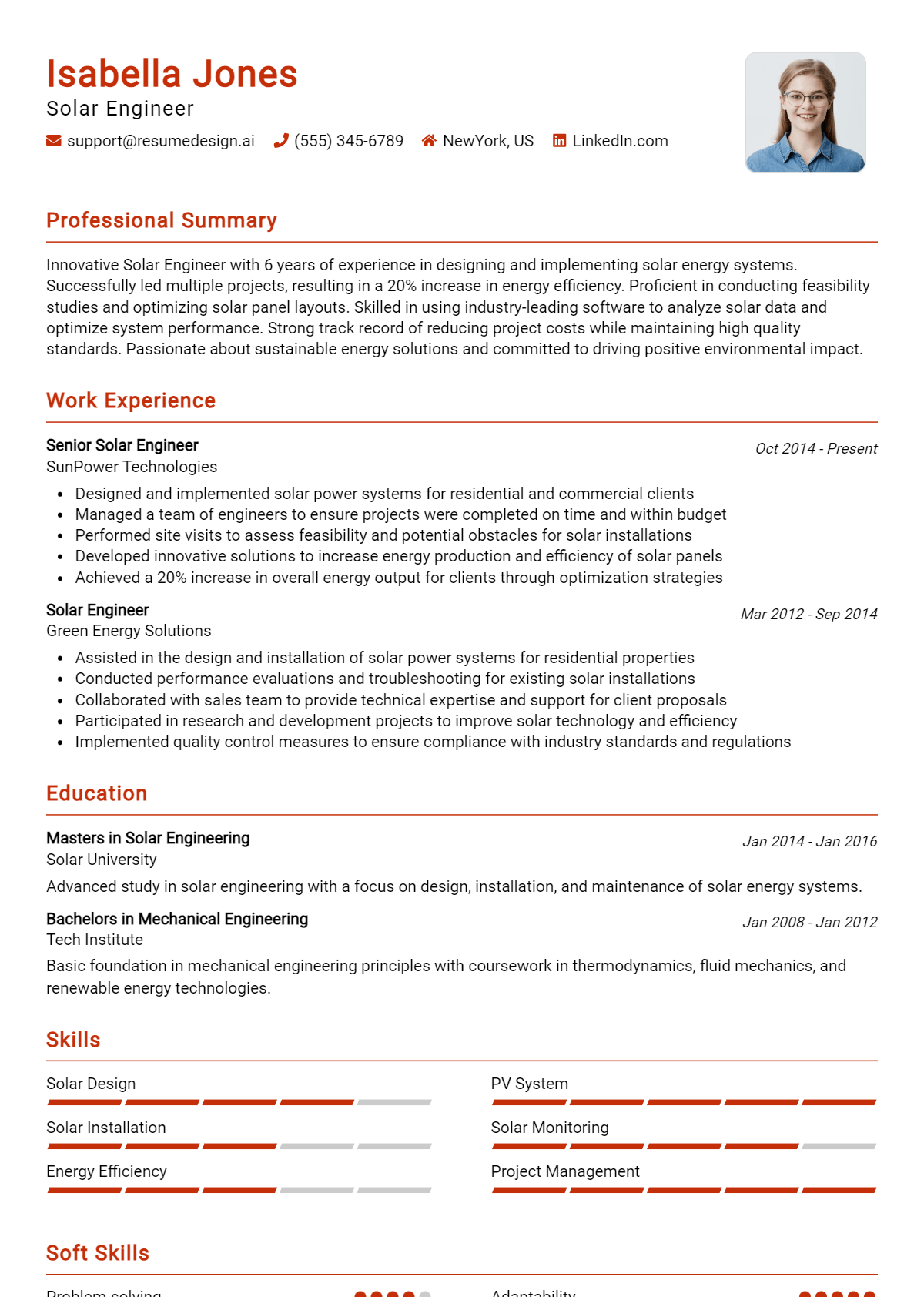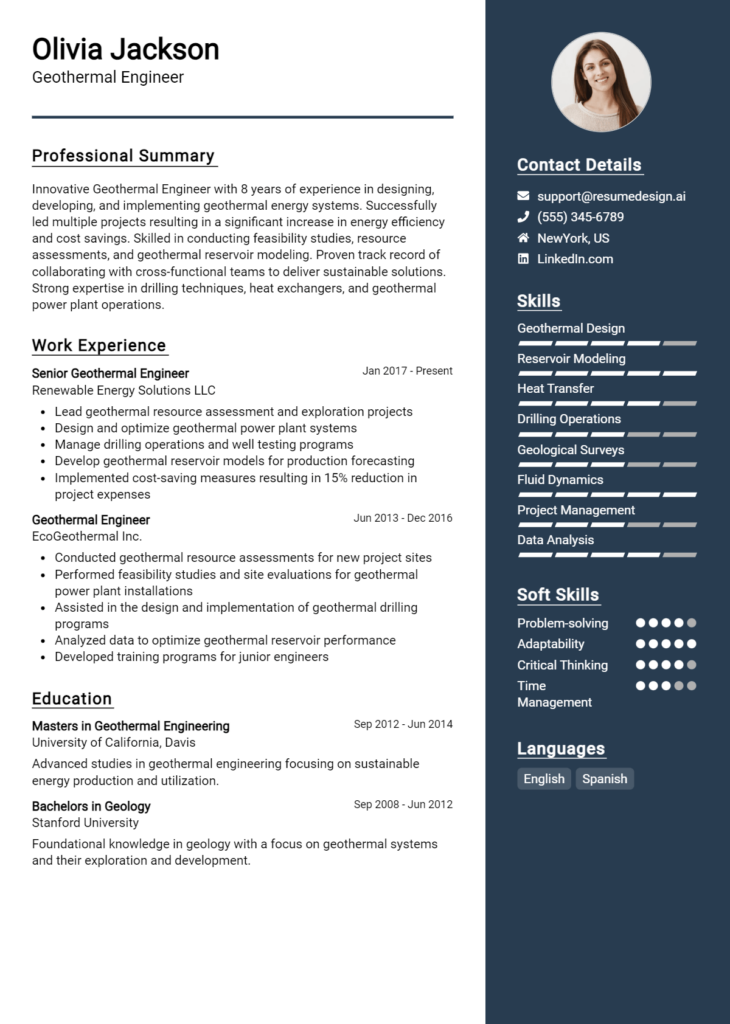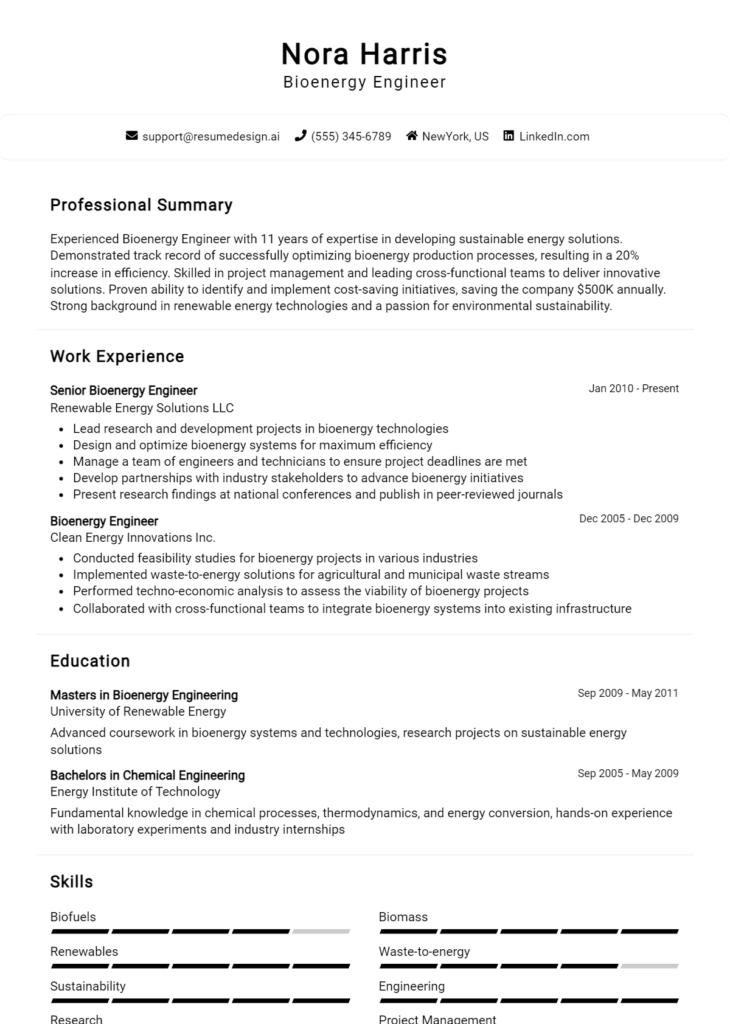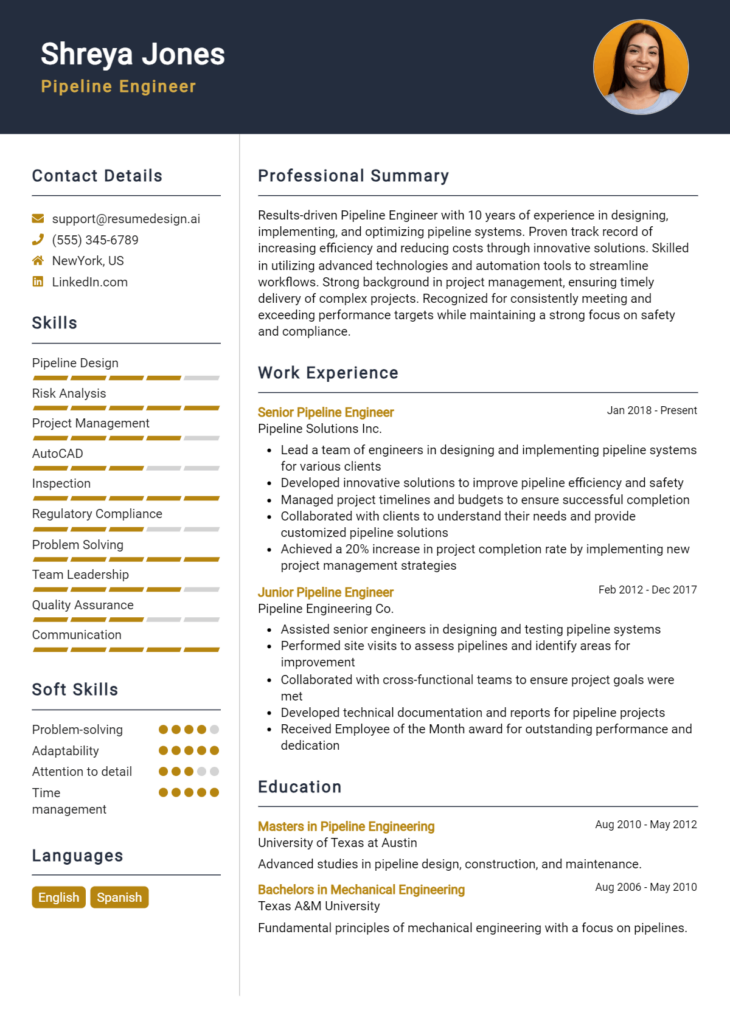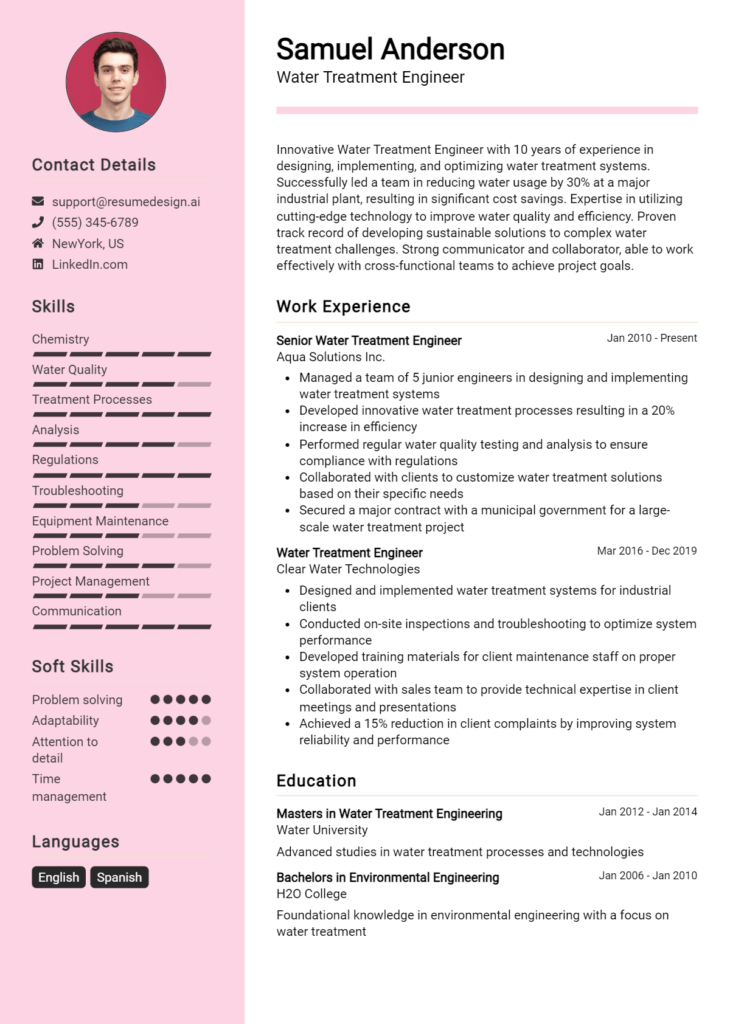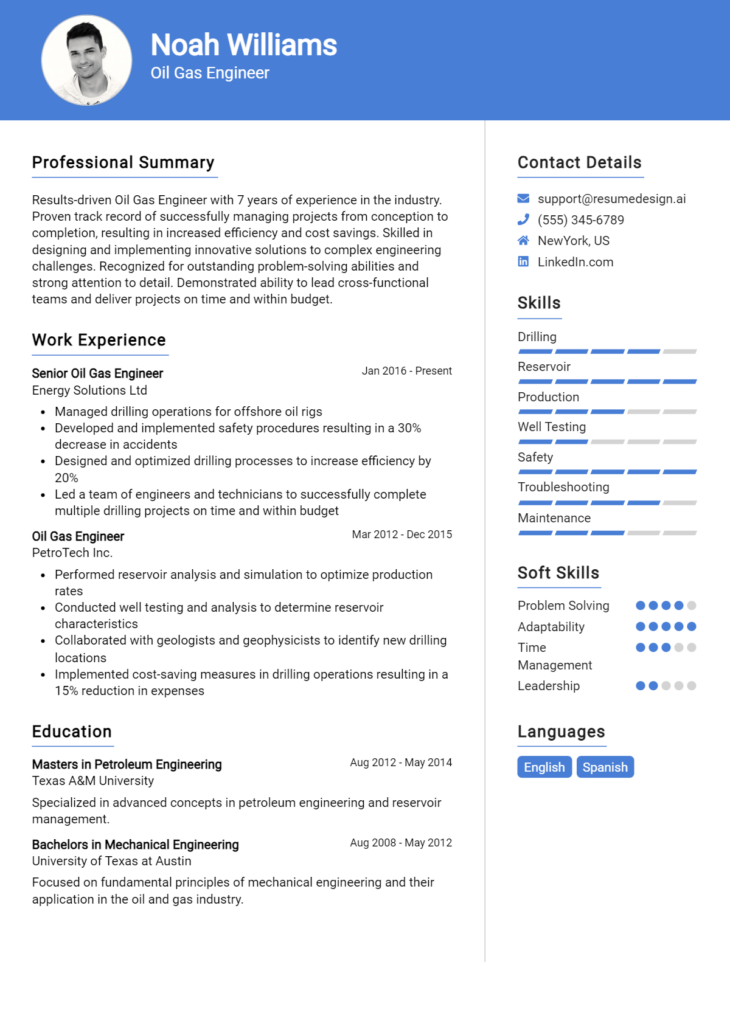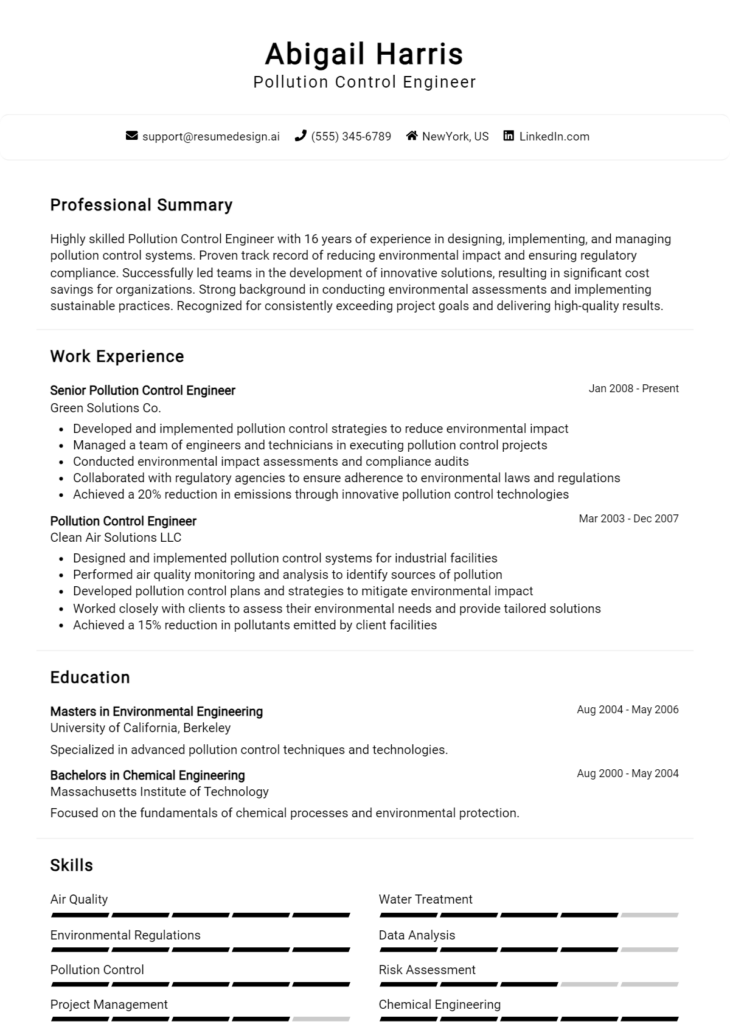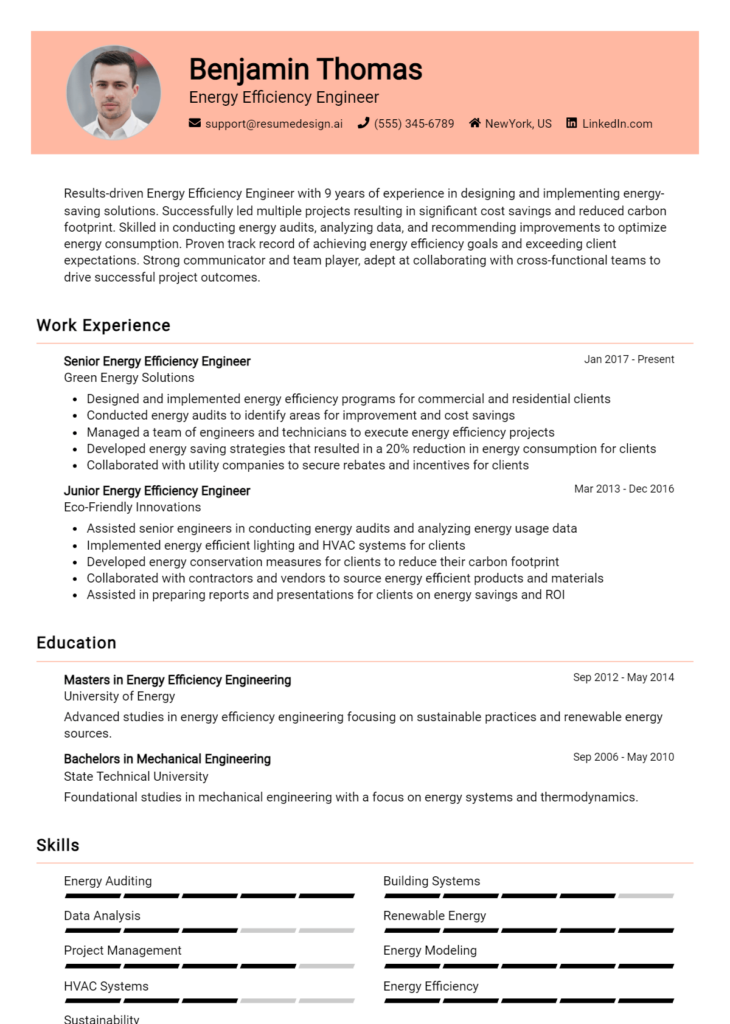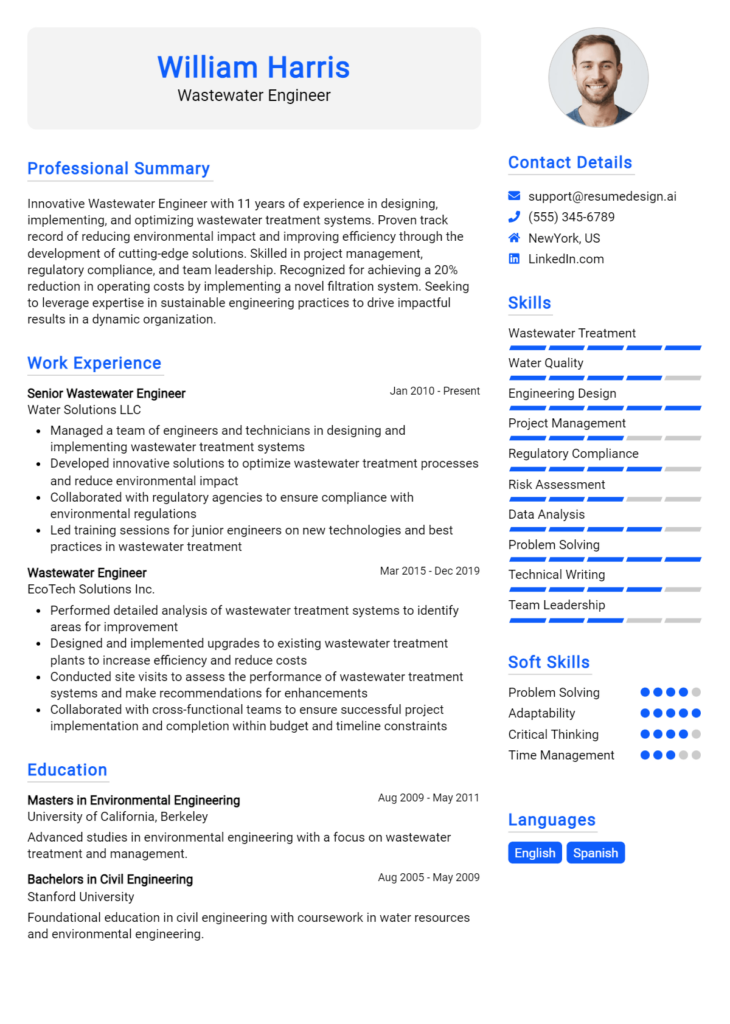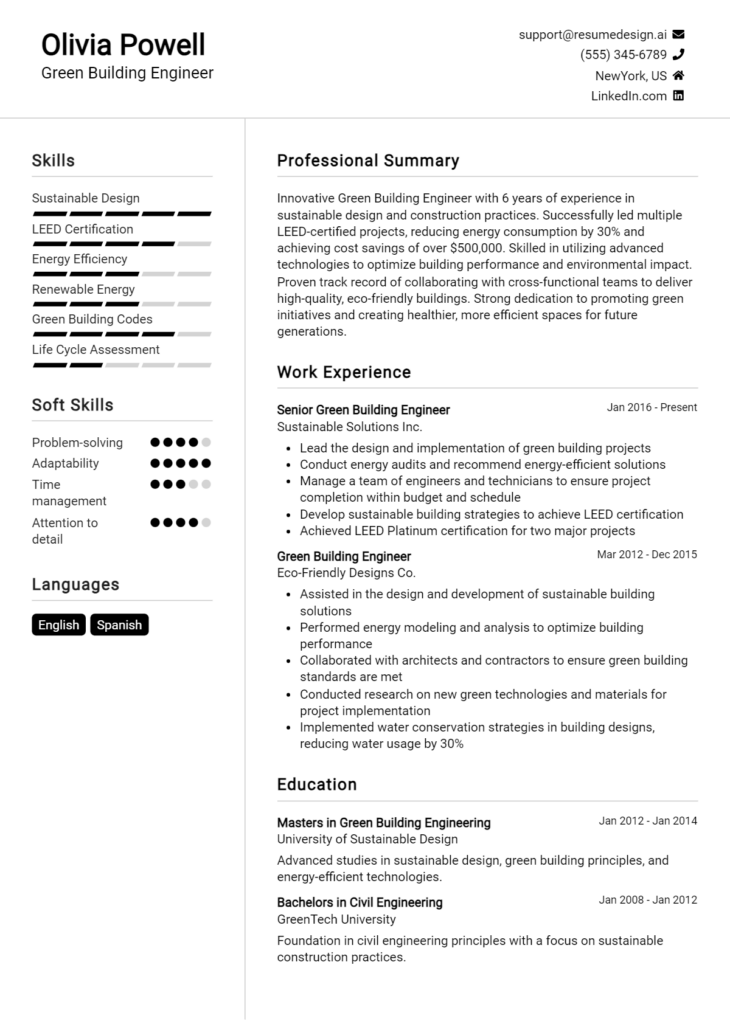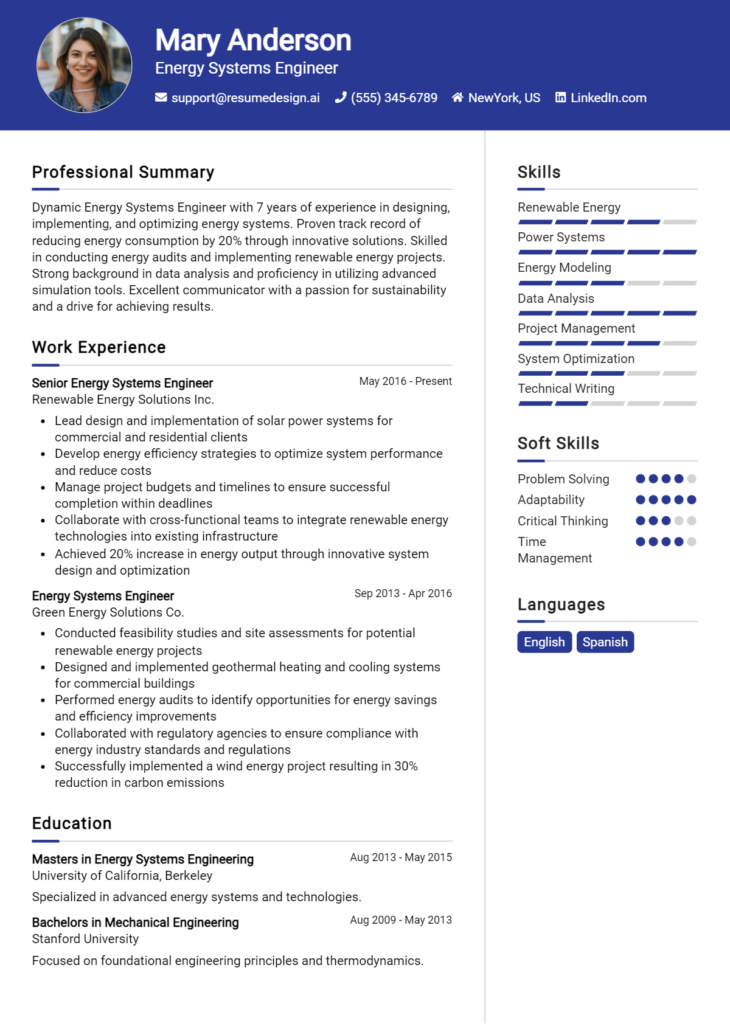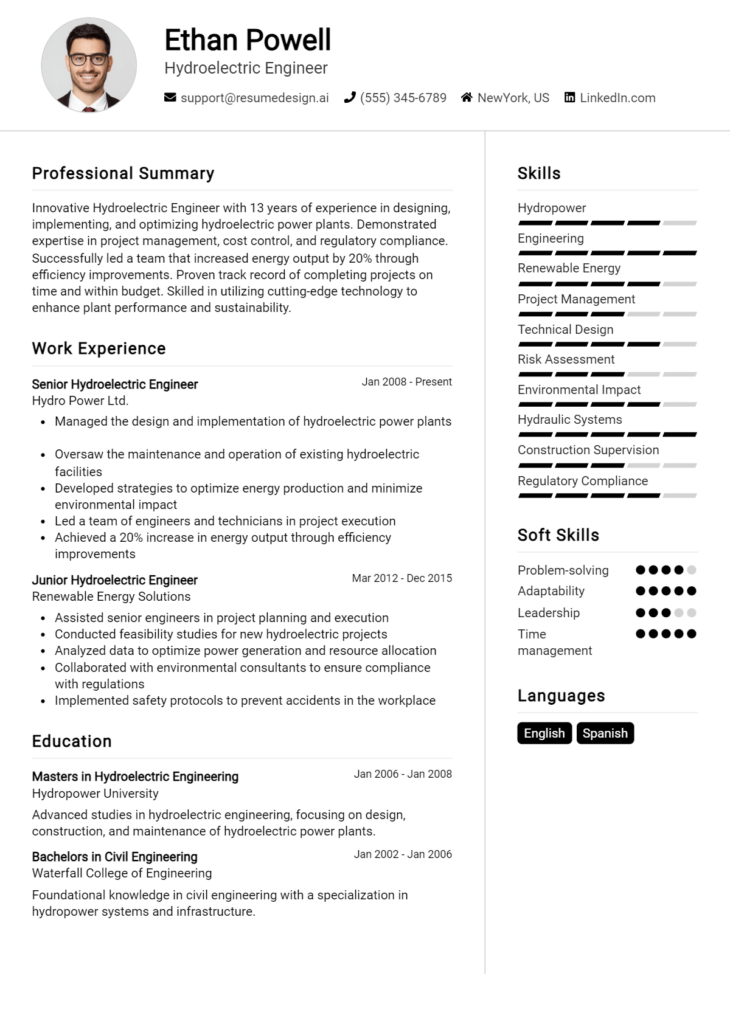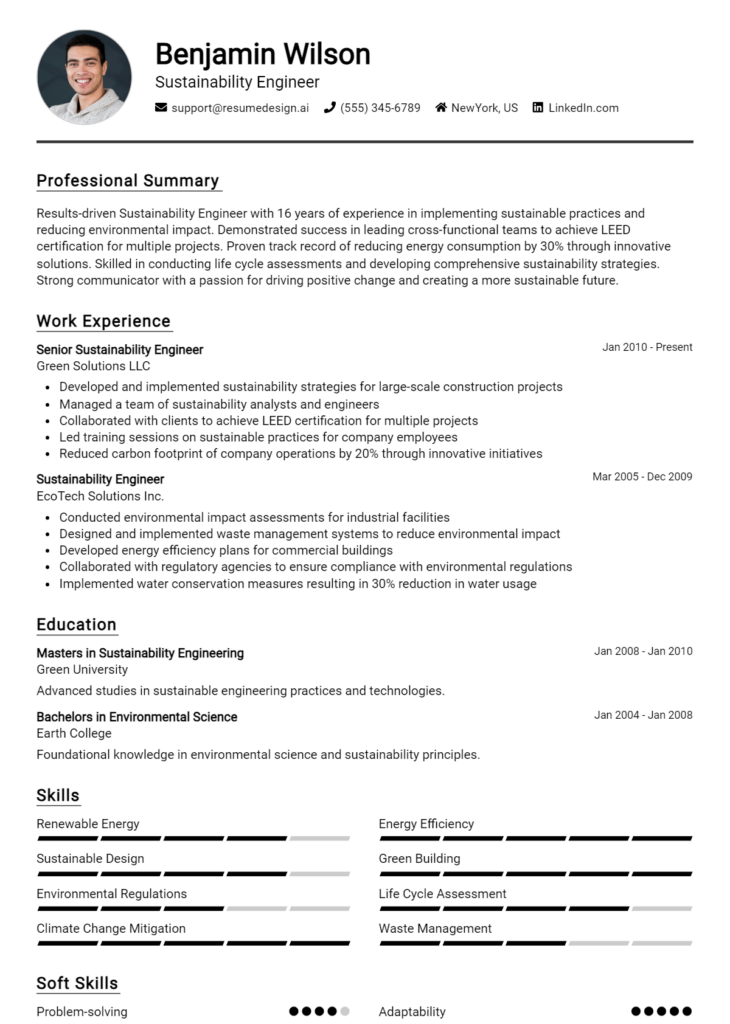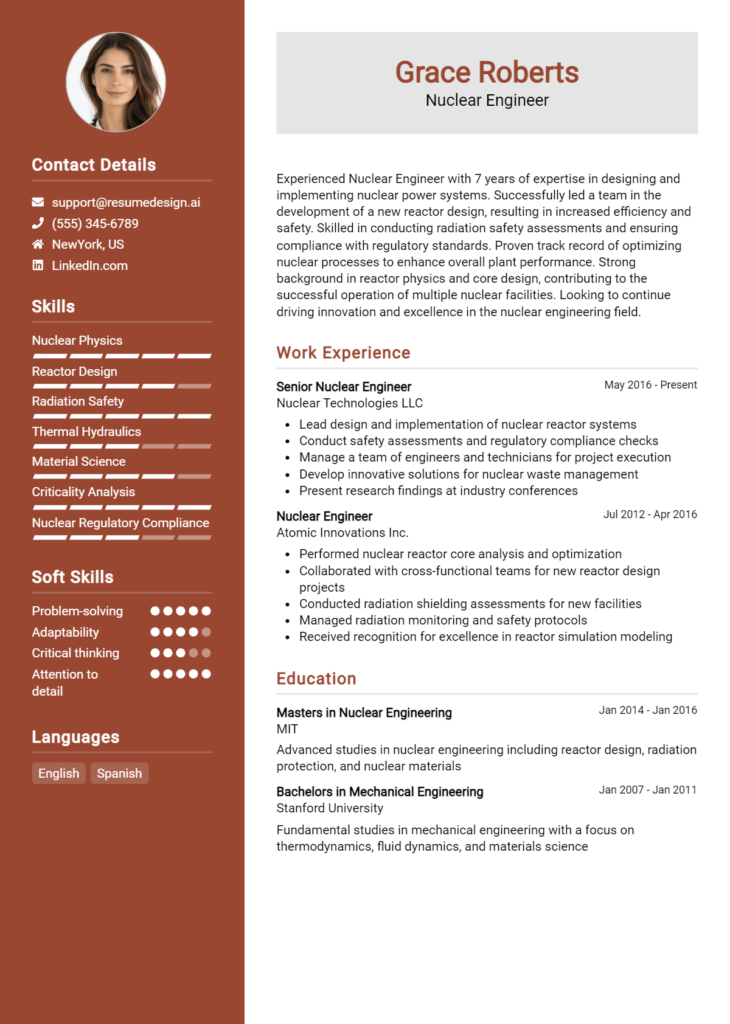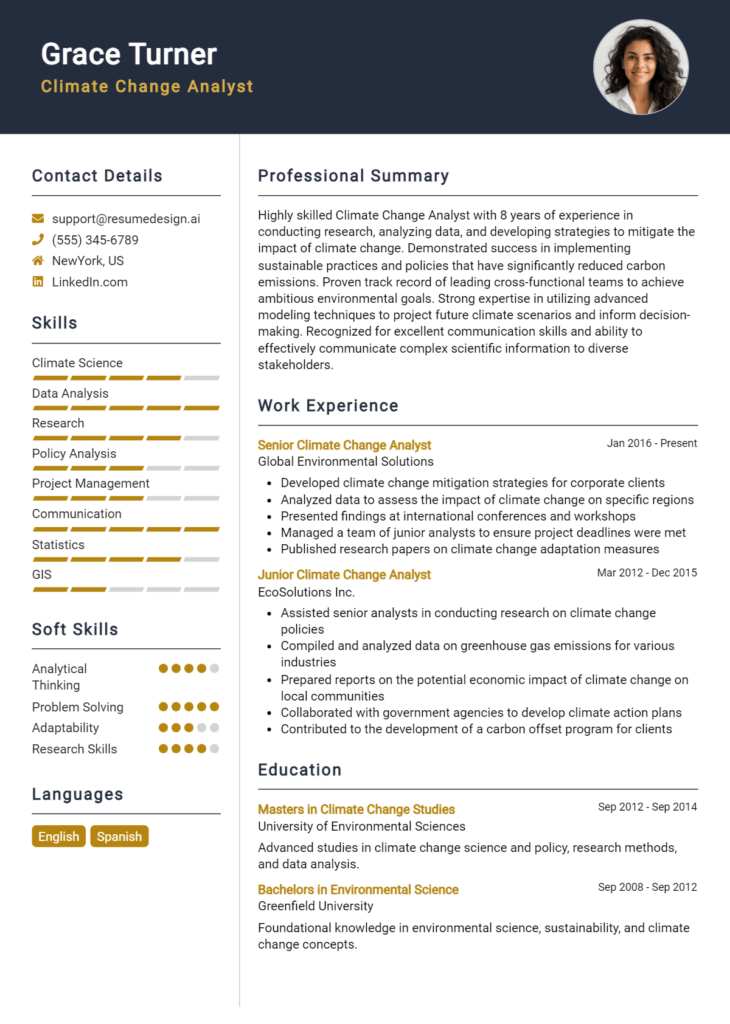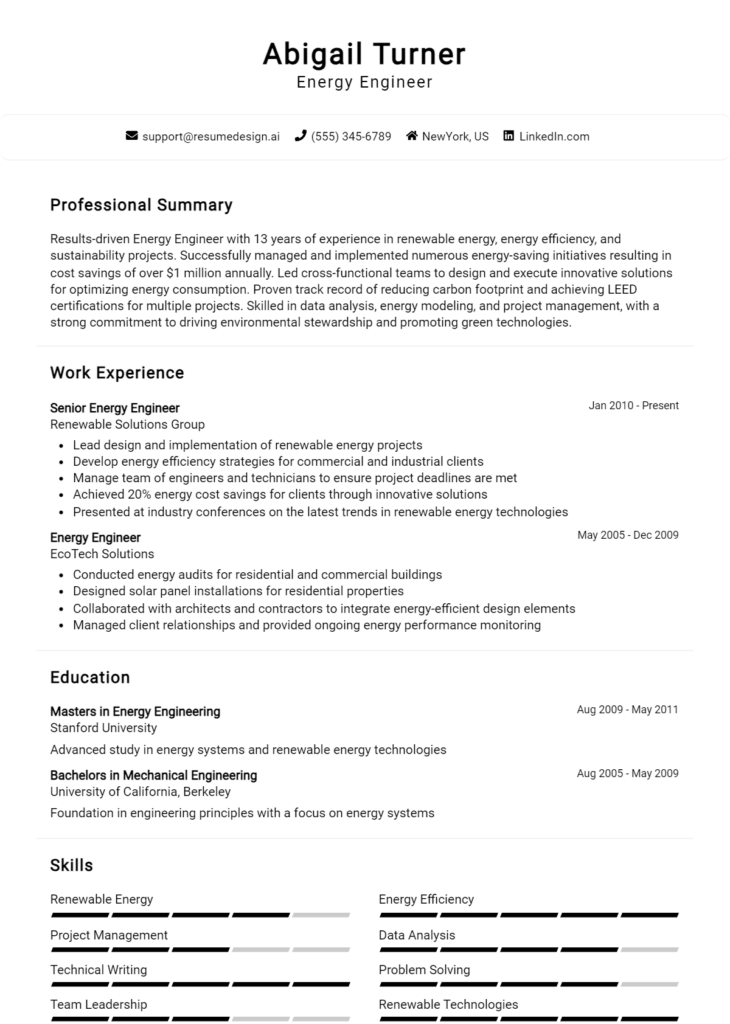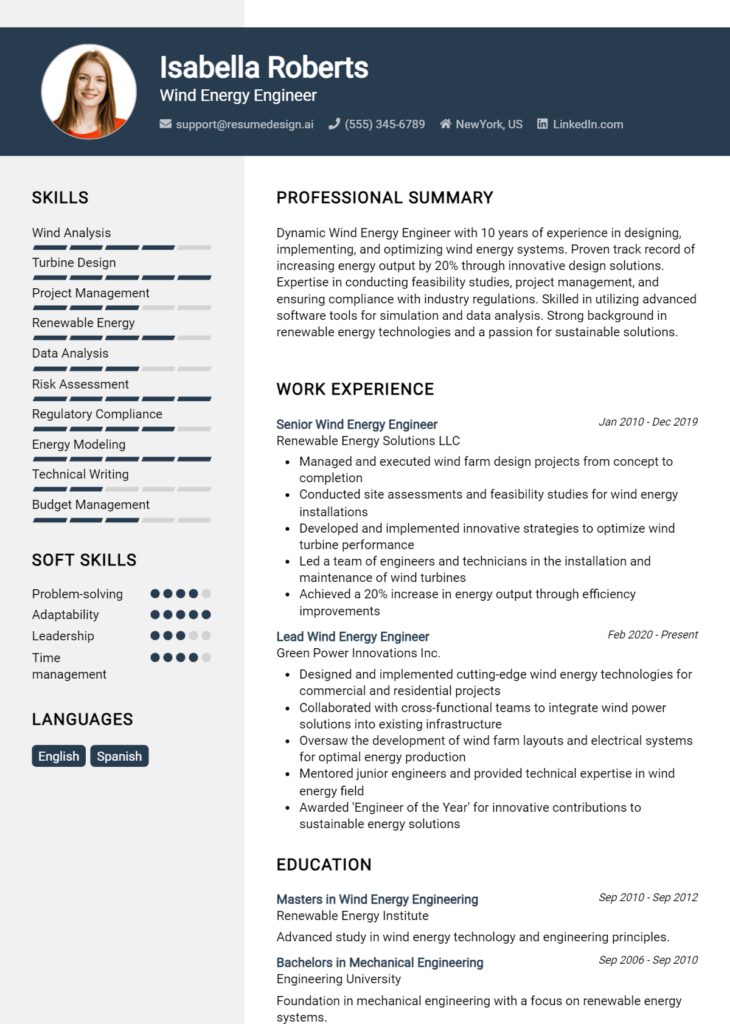Solar Engineer Core Responsibilities
A Solar Engineer plays a crucial role in designing, implementing, and maintaining solar energy systems, bridging the gap between engineering, project management, and environmental sustainability. Key responsibilities include conducting site assessments, optimizing solar designs, and ensuring compliance with regulations. Strong technical knowledge, operational expertise, and problem-solving skills are essential for success, as they directly influence project efficiency and effectiveness. A well-structured resume that highlights these qualifications is vital to showcasing one's ability to contribute to the organization's renewable energy goals.
Common Responsibilities Listed on Solar Engineer Resume
- Conduct site assessments to evaluate solar energy potential.
- Design solar energy systems tailored to client needs.
- Collaborate with cross-functional teams for project execution.
- Perform energy yield analysis and feasibility studies.
- Ensure compliance with local regulations and standards.
- Oversee the installation and commissioning of solar systems.
- Develop maintenance plans for solar infrastructure.
- Provide technical support and troubleshooting for system issues.
- Stay updated on industry trends and technologies.
- Prepare detailed project reports and documentation.
- Engage with stakeholders to promote solar initiatives.
High-Level Resume Tips for Solar Engineer Professionals
In the competitive landscape of the renewable energy sector, a well-crafted resume is crucial for Solar Engineer professionals aiming to make a lasting impression on potential employers. Your resume often serves as the first point of contact, setting the tone for how hiring managers perceive your skills, qualifications, and achievements. It must not only showcase your technical expertise but also reflect your accomplishments in the field of solar energy. This guide will provide practical and actionable resume tips specifically tailored for Solar Engineer professionals, empowering you to create a document that effectively communicates your value to prospective employers.
Top Resume Tips for Solar Engineer Professionals
- Customize your resume for each job application by aligning your skills and experiences with the job description.
- Highlight relevant experience in solar design, installation, and maintenance to demonstrate your technical knowledge.
- Quantify your achievements by using metrics, such as energy output increases or cost savings from previous projects.
- Showcase industry-specific skills like photovoltaic system design, energy modeling, and familiarity with solar software tools.
- Include certifications and licenses, such as NABCEP Solar PV Installer Certification, to enhance your credibility.
- Utilize action verbs to describe your contributions, making your resume dynamic and engaging.
- Incorporate keywords from the job description to pass through Applicant Tracking Systems (ATS) effectively.
- Keep your format clean and professional, using bullet points for easy readability and ensuring consistency in font and style.
- Emphasize teamwork and communication skills, as collaboration is often key in solar engineering projects.
- Don’t forget to include relevant projects or internships, illustrating your hands-on experience in the field.
By implementing these tips, you can significantly increase your chances of landing a job in the Solar Engineer field. A polished and tailored resume not only highlights your qualifications but also conveys your passion for renewable energy, ultimately making you a more appealing candidate to hiring managers in this evolving industry.
Why Resume Headlines & Titles are Important for Solar Engineer
In the competitive field of solar engineering, a resume headline or title plays a crucial role in making a strong first impression on hiring managers. A well-crafted headline not only captures attention but also succinctly summarizes a candidate's key qualifications and expertise in a single impactful phrase. This concise representation should be relevant to the specific job being applied for, instantly communicating the applicant's value and aligning their skills with the needs of the employer. A strong resume headline can set the tone for the entire application, encouraging hiring professionals to delve deeper into the candidate's qualifications.
Best Practices for Crafting Resume Headlines for Solar Engineer
- Keep it concise: Aim for a headline that is clear and to the point, ideally one to two lines long.
- Be role-specific: Tailor the headline to the solar engineering position you are applying for.
- Highlight key skills: Incorporate important skills or certifications that are relevant to the role.
- Use strong action words: Choose dynamic language that conveys your expertise and achievements.
- Include numbers or metrics: If applicable, quantify your accomplishments to provide context and impact.
- Avoid vague phrases: Steer clear of generic terms that do not provide insight into your qualifications.
- Update for each application: Customize your headline for each job application to reflect the specific requirements of the position.
Example Resume Headlines for Solar Engineer
Strong Resume Headlines
Innovative Solar Engineer with 5+ Years of Experience in Renewable Energy Solutions
Certified Solar PV Installer Specializing in High-Efficiency Energy Systems
Expert Solar Engineer Driven by Sustainable Design and Project Management Success
Weak Resume Headlines
Engineer Looking for Opportunities
Solar Professional with Experience
The strong headlines are effective because they precisely convey the candidate's specific expertise, experience, and commitment to the solar engineering field, making them stand out to hiring managers. In contrast, the weak headlines lack detail and clarity, failing to showcase the applicant's unique qualifications or indicate what they bring to the role. This lack of specificity can easily lead to the resumes being overlooked in favor of more compelling candidates.
Writing an Exceptional Solar Engineer Resume Summary
A resume summary is a crucial element for a Solar Engineer's application, as it serves as the first impression for hiring managers. A strong summary quickly captures attention by succinctly showcasing key skills, experience, and accomplishments that are directly relevant to the role. It acts as a powerful marketing tool that highlights the candidate's unique qualifications and value proposition, making it essential to be concise, impactful, and tailored to the specific job being applied for. An effective summary sets the tone for the rest of the resume and can significantly influence the hiring decision.
Best Practices for Writing a Solar Engineer Resume Summary
- Quantify Achievements: Use numbers and percentages to demonstrate your impact, such as energy savings or project sizes.
- Focus on Relevant Skills: Highlight technical skills specific to solar engineering, such as system design or project management.
- Tailor to the Job Description: Customize your summary to align with the specific requirements and responsibilities of the position.
- Be Concise: Keep your summary brief, ideally 2-4 sentences, to maintain the reader’s attention.
- Use Action Verbs: Start sentences with strong action verbs to convey confidence and proactivity.
- Showcase Certifications: Mention any relevant certifications or licenses that enhance your credibility as a Solar Engineer.
- Highlight Industry Experience: Include years of experience and specific industries you’ve worked in to provide context.
- Emphasize Problem-Solving Skills: Illustrate your ability to tackle challenges and implement effective solutions in solar projects.
Example Solar Engineer Resume Summaries
Strong Resume Summaries
Results-driven Solar Engineer with over 5 years of experience in designing and implementing photovoltaic systems, achieving a 30% increase in energy efficiency for residential projects. Proven track record of managing projects under budget and on schedule, with a focus on sustainability and innovation.
Detail-oriented Solar Engineer with a strong background in solar thermal and PV technology. Successfully led a team that installed 200+ solar panels, generating an estimated 500 MWh of renewable energy annually. Certified in NABCEP PV Installation, with a commitment to optimizing system performance.
Innovative Solar Engineer with expertise in system design and performance analysis, contributing to a 25% reduction in energy costs for commercial clients. Proficient in using advanced modeling software and conducting feasibility studies to ensure project viability.
Weak Resume Summaries
Experienced engineer looking for a position in solar energy. I have worked on various projects and have some knowledge of solar technology.
Solar Engineer with a background in renewable energy. I am interested in applying my skills to a new role and contributing to the team.
The strong resume summaries are considered effective because they include specific, quantifiable achievements and relevant skills that align with the Solar Engineer role. They demonstrate the candidate’s impact and expertise in the field. In contrast, the weak summaries lack detail and specificity, failing to convey the candidate's value or unique qualifications, which could lead to a missed opportunity with potential employers.
Work Experience Section for Solar Engineer Resume
The work experience section of a Solar Engineer resume is a critical component that highlights the candidate's technical skills, leadership capabilities, and commitment to delivering high-quality solar energy solutions. This section serves as a platform for showcasing a candidate's practical experience in the solar industry, illustrating their ability to manage teams effectively, complete projects on time, and contribute to sustainable energy initiatives. By quantifying achievements and aligning past experiences with industry standards, candidates can effectively demonstrate their value to potential employers and stand out in a competitive job market.
Best Practices for Solar Engineer Work Experience
- Highlight specific technical skills relevant to solar engineering, such as photovoltaic system design and energy modeling.
- Quantify achievements with concrete data, such as the percentage increase in energy efficiency or cost savings achieved.
- Showcase leadership experience by detailing any team management roles or project oversight responsibilities.
- Include collaborative projects that illustrate teamwork with other engineers, stakeholders, or regulatory bodies.
- Tailor your experience to reflect industry standards and expectations, using terminology familiar to hiring managers.
- Focus on results-driven narratives that demonstrate problem-solving abilities and innovation in solar projects.
- Use action verbs to describe responsibilities and achievements, enhancing the overall impact of your statements.
- Keep descriptions concise while providing enough detail to convey the significance of your contributions.
Example Work Experiences for Solar Engineer
Strong Experiences
- Led a team of engineers in the design and implementation of a 5MW solar farm, resulting in a 30% reduction in installation costs and a 25% increase in energy output.
- Developed a predictive maintenance program that decreased equipment downtime by 40%, improving overall system reliability and customer satisfaction.
- Collaborated with cross-functional teams to secure $1 million in funding for solar projects, facilitating the installation of over 2,000 residential solar systems.
- Designed and executed a solar energy optimization strategy that increased the efficiency of existing installations by 15% within one year.
Weak Experiences
- Worked on solar projects that were somewhat successful.
- Assisted in various tasks related to solar engineering.
- Participated in team meetings and discussed solar energy concepts.
- Helped with some design work on solar panels.
The examples categorized as strong experiences clearly demonstrate quantifiable outcomes, technical leadership, and collaboration, showcasing the candidate's impact in their previous roles. In contrast, the weak experiences lack specificity and measurable results, making them less compelling to potential employers. Strong statements convey confidence and expertise, while weak statements may suggest a lack of engagement or significant contributions in the field.
Education and Certifications Section for Solar Engineer Resume
The education and certifications section of a Solar Engineer resume is crucial as it serves to showcase the candidate's academic achievements, industry-recognized certifications, and commitment to continuous professional development. This section not only underscores the foundational knowledge that a candidate possesses but also highlights specialized training and coursework that are directly applicable to the solar energy industry. By detailing relevant educational experiences and certifications, candidates can significantly enhance their credibility and demonstrate their alignment with the specific requirements of the job role.
Best Practices for Solar Engineer Education and Certifications
- Focus on relevant degrees in engineering, renewable energy, or related fields.
- Highlight industry-recognized certifications such as NABCEP Solar PV Installer.
- Include specific coursework that aligns with solar technology, energy systems, or environmental science.
- List any advanced degrees or specialized training that may set you apart from other candidates.
- Keep the section organized and easy to read, using bullet points for clarity.
- Update the section regularly to include new certifications or ongoing education.
- Prioritize certifications that are recognized and valued in the renewable energy sector.
- Provide context for certifications by mentioning the issuing organization and date obtained.
Example Education and Certifications for Solar Engineer
Strong Examples
- Bachelor of Science in Electrical Engineering, University of California, 2020
- Certified Solar PV Installer, North American Board of Certified Energy Practitioners (NABCEP), 2021
- Master's in Renewable Energy Systems, Stanford University, 2022
- Coursework in Solar Energy Engineering, Energy Storage Systems, and Photovoltaic System Design
Weak Examples
- Bachelor of Arts in History, University of Texas, 2018
- Certification in Basic Computer Skills, Online Provider, 2019
- High School Diploma, Local High School, 2015
- Outdated National Renewable Energy Certification, Expired 2020
The examples above illustrate a clear distinction between strong and weak qualifications. Strong examples are directly relevant to the solar engineering field, demonstrating both educational background and current industry credentials that enhance the candidate's profile. In contrast, weak examples lack relevance to the solar energy sector, showcasing degrees and certifications that do not contribute to the candidate's qualifications for a Solar Engineer role. This highlights the importance of aligning educational experiences with the specific demands of the job to create a compelling resume.
Top Skills & Keywords for Solar Engineer Resume
As a Solar Engineer, showcasing the right skills on your resume is crucial for standing out in a competitive job market. Employers seek candidates who not only possess technical expertise but also demonstrate strong interpersonal abilities. A well-crafted resume, highlighting both hard and soft skills, can effectively convey your qualifications and suitability for the role. This combination of skills not only illustrates your proficiency in solar technology but also your capability to work collaboratively in teams, manage projects, and communicate effectively with stakeholders. To maximize your chances of landing an interview, it's important to include the most relevant skills that align with the job description and highlight your unique strengths.
Top Hard & Soft Skills for Solar Engineer
Soft Skills
- Problem-solving
- Communication
- Team collaboration
- Project management
- Adaptability
- Critical thinking
- Attention to detail
- Creativity
- Time management
- Customer service orientation
Hard Skills
- Solar photovoltaic (PV) system design
- Energy modeling and simulation software (e.g., PVsyst, SAM)
- Electrical engineering principles
- Knowledge of solar energy regulations and policies
- System installation and maintenance
- Data analysis and interpretation
- Renewable energy technologies
- CAD software proficiency
- Performance monitoring systems
- Technical writing and documentation
For more information on the skills necessary for crafting a compelling resume, and how to effectively present your work experience, consider exploring additional resources to enhance your application.
Stand Out with a Winning Solar Engineer Cover Letter
Dear Hiring Manager,
I am excited to submit my application for the Solar Engineer position at [Company Name]. With a robust background in renewable energy systems and a passion for sustainable solutions, I am eager to contribute my expertise in photovoltaic design, system optimization, and project management to your innovative team. My experience encompasses a range of projects, from residential solar installations to large-scale solar farms, allowing me to develop a comprehensive understanding of the solar energy landscape and the technical skills necessary to excel in this role.
Throughout my career, I have successfully led multiple solar projects from conception through execution. At [Previous Company], I played a pivotal role in the design and implementation of a 500 kW solar array that reduced energy costs by 30% for the client while significantly decreasing their carbon footprint. My proficiency in software tools such as PVsyst and AutoCAD, combined with my strong analytical skills, enables me to create precise designs and maximize energy production. Additionally, my collaborative approach to working with cross-functional teams ensures that projects are completed on time and within budget while adhering to all safety and regulatory standards.
I am particularly drawn to [Company Name] because of its commitment to pioneering advancements in solar technology and its dedication to making renewable energy accessible to all. I admire your recent initiatives in community solar projects and believe that my skills in stakeholder engagement and project coordination would further enhance your efforts. I am eager to bring my innovative mindset and technical expertise to your team, helping to develop cutting-edge solar solutions that align with your mission of sustainability and environmental stewardship.
Thank you for considering my application. I look forward to the opportunity to discuss how my background and passion for solar energy can contribute to the ongoing success of [Company Name]. I am enthusiastic about the possibility of joining your team and driving impactful solar initiatives that benefit both clients and the planet.
Sincerely,
[Your Name]
[Your Contact Information]
Common Mistakes to Avoid in a Solar Engineer Resume
When crafting a resume for a Solar Engineer position, it's crucial to present a clear and compelling narrative of your qualifications, skills, and experiences. However, many candidates make common mistakes that can hinder their chances of landing an interview. By being aware of these pitfalls, you can create a more effective resume that highlights your expertise in solar energy systems, project management, and engineering principles.
Vague Job Descriptions: Failing to provide specific details about previous roles can leave hiring managers unsure of your actual responsibilities and achievements. Instead, use quantifiable metrics to showcase your contributions.
Ignoring Relevant Keywords: Many companies use applicant tracking systems (ATS) to filter resumes. Not including industry-specific keywords can result in your resume being overlooked. Research common terms in solar engineering and incorporate them into your document.
Overloading with Technical Jargon: While technical expertise is important, using too much jargon can alienate readers not familiar with specific terms. Aim for a balance between technical language and clear descriptions that anyone can understand.
Neglecting Soft Skills: Solar engineering often involves teamwork and communication with clients or stakeholders. Focusing solely on technical skills without highlighting soft skills can give an incomplete picture of your capabilities.
Lack of Customization: Sending out the same resume for every job application can be a missed opportunity. Tailor your resume for each position by aligning your experiences with the job description, demonstrating your genuine interest in the role.
Formatting Issues: A cluttered or poorly formatted resume can detract from your qualifications. Use consistent fonts, clear headings, and ample white space to ensure your resume is easy to read and professional.
Not Showcasing Achievements: Simply listing job duties without highlighting your accomplishments can make your resume less impactful. Use bullet points to emphasize significant projects, awards, or recognitions that illustrate your success in previous roles.
Forgetting to Proofread: Typos and grammatical errors can undermine your professionalism. Always proofread your resume or have someone else review it to catch any mistakes before submission.
Conclusion
As we wrap up our exploration of the Solar Engineer role, it's essential to highlight the critical skills and qualifications that can set you apart in this rapidly growing field. Solar Engineers are tasked with designing, implementing, and optimizing solar energy systems, requiring a solid foundation in engineering principles, an understanding of renewable energy technologies, and strong project management skills.
Key points discussed include the importance of technical knowledge in photovoltaic systems, the necessity for certifications, and the value of practical experience in the field. Additionally, the ability to collaborate with multidisciplinary teams and communicate effectively with stakeholders is vital for success in this role.
As you consider your journey towards becoming a Solar Engineer or advancing your career in this area, it's crucial to ensure your resume reflects your strengths and qualifications effectively. Now is the perfect time to review your Solar Engineer resume!
To assist you, we recommend utilizing available resources such as resume templates, which can provide you with a professional format, and a resume builder that allows for easy customization. Additionally, you can check out resume examples to gather inspiration and see what successful candidates have included in their applications. Don’t forget to enhance your job application further with our cover letter templates, ensuring you present your best self to potential employers. Take action today and sharpen your resume to stand out in the solar engineering field!

